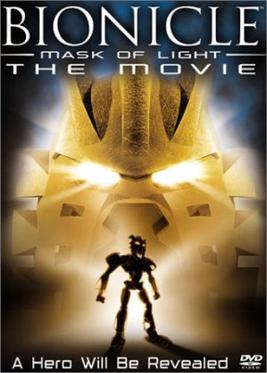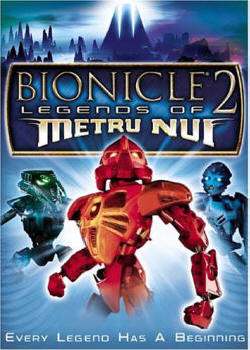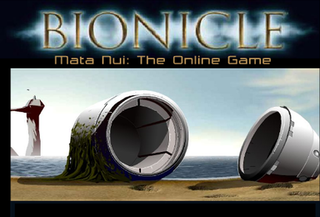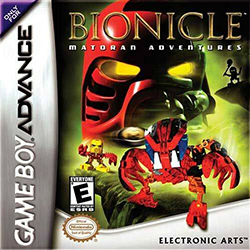Bionicle is a line of Lego construction toys, marketed primarily towards 8-to-16-year-olds. The line originally launched in 2001 as a subsidiary of Lego's Technic series. Over the following decade, it became one of Lego's biggest-selling properties, turning into a franchise and being one of the many factors in saving the company from its financial crisis of the late 1990s. Despite a planned twenty-year tenure, the theme was discontinued in 2010, but was rebooted in 2015 for a further two years.

Bionicle 3: Web of Shadows is a 2005 computer-animated science fantasy action film based on the Bionicle toy line by Lego and the third installment in the Bionicle film series. It is a direct sequel to Bionicle 2: Legends of Metru Nui, and largely adapts the 2005 storyline with the majority of events taking place before the previous film's ending. Like Legends of Metru Nui, Web of Shadows is a prequel to the first film, Bionicle: Mask of Light. This is the first Bionicle film to not be given a rating by the MPAA. It was released on DVD on October 11, 2005, by Buena Vista Home Entertainment under the Miramax Home Entertainment label.

Bionicle: Mask of Light, stylized as BIONICLE: Mask of Light — The Movie, is a 2003 computer-animated science fantasy action film based on the Bionicle toyline by Lego, and particularly serves as a direct adaptation to the latter half of the toyline's 2003 narrative. Set in a universe filled with bio-mechanical beings allied with classical element-themed tribes, the story follows two friends from the fire-based village of Ta-Koro on a quest to find the owner of the Mask of Light, a mystical artifact that can potentially defeat Makuta, an evil entity threatening the island.

Bionicle 2: Legends of Metru Nui is a 2004 computer-animated science fantasy action film and the second film based on Lego's Bionicle toy line. It is a prequel to the first film, Bionicle: Mask of Light. This film follows the 2004 storyline and was created using Lego elements from the Bionicle series. It is also the second of the two films in the franchise to be given a rating by the MPAA. It was released on DVD and VHS on October 19, 2004, by Buena Vista Home Entertainment under the Miramax Home Entertainment label.

Bionicle is a 2003 platform video game developed by Argonaut Games and published by Electronic Arts and Lego Interactive for GameCube, PlayStation 2, Xbox, and Microsoft Windows. A port was released for Mac OS X, and a version was also developed for the Game Boy Advance. In the home console version, the player controls the Toa, elementally-powered warriors, as they traverse through levels; some levels are 3D platformers, while others utilize mechanics like snowboarding or lava surfing. The game's story, which takes creative liberties with the official Bionicle story, follows the Toa as they defend the island of Mata Nui from the return of the evil Makuta and his minions.

Bionicle Heroes is a 2006 video game published by Eidos Interactive and TT Games Publishing and based on Lego's Bionicle line of constructible action figures. The game was released in November 2006 on PlayStation 2, Xbox 360, GameCube, Microsoft Windows, Game Boy Advance, and Nintendo DS; a Nintendo Wii version was later released in April 2007. The home console and PC versions were developed by Traveller's Tales, while Amaze Entertainment developed the handheld versions. A version of the game for mobile phones, developed by Universomo, was also released. The home console and PC versions of the game are third-person shooters, while the Game Boy Advance version is a run 'n' gun shoot 'em up and the Nintendo DS version is a first-person shooter. The story of Bionicle Heroes, where the player seeks to liberate the island of Voya Nui and its inhabitants from the villainous Piraka, is not canon to the official Bionicle story.

Mata Nui Online Game is a 2001 point-and-click adventure browser game developed by Templar Studios to promote the Lego Bionicle line of constructible action figures. The game follows Takua, a villager on the island of Mata Nui, as he explores the island, encountering other villagers and the Toa, heroic elemental warriors, on their quest to defeat the evil Makuta.

Lego Bionicle: Quest for the Toa is a 2001 action-adventure game developed by Saffire and published by Lego Software for the Game Boy Advance. Based on the Lego Group's Bionicle line of constructible action figures, the game follows Takua, a villager on the island of Mata Nui, on a quest to rescue the island's Turaga elders and summon the Toa, heroic elemental warriors destined to defeat the evil Makuta.
The acknowledgement of Lego in popular culture is demonstrated by the toy's wide representation in publication, television and film, and its common usage in artistic and cultural works.

Bionicle: Matoran Adventures is a 2002 platform game based on Lego's Bionicle line of constructible action figures. It was developed by Argonaut Games and co-published by Electronic Arts and Lego Interactive for the Game Boy Advance. The player controls Matoran and Turaga characters, who must work together to repel the invasion of Bohrok, insect-like robots that threaten the island of Mata Nui.

"Bye Bye Babylon" is a song by Danish rock band Cryoshell, released as their debut single from their self-titled debut studio album on July 19, 2009. Written by Mikkel Maltha, Kasper Søderlund and Christine Lorentzen, the song was recorded between late 2008 and early 2009 and produced by Jacob Hansen. It is an alternative and symphonic rock song that also encompasses Middle Eastern musical elements.

Lego Bionicle: The Legend of Mata Nui is a canceled action-adventure video game developed by Saffire. Based on the Lego Group's Bionicle line of constructible action figures, the game was intended to release on Microsoft Windows computers in late 2001 and the GameCube in early 2002. The game was designed as a direct sequel to Saffire's Game Boy Advance game Lego Bionicle: Quest for the Toa, which was released in October 2001. The story of The Legend of Mata Nui was meant to serve as a conclusion to the 2001 Bionicle story arc, focusing on the Toa, heroic elemental warriors destined to defeat the evil Makuta, who is attacking the island of Mata Nui with corrupted Rahi animals.
The music of the animated direct-to-video feature films based on the Bionicle toy line by Lego was composed by Nathan Furst and John D'Andrea. Furst composed the scores for the first three films released by Miramax & Buena Vista Home Entertainment – Bionicle: Mask of Light (2003), Bionicle 2: Legends of Metru Nui (2004), and Bionicle 3: Web of Shadows (2005) – while D'Andrea composed the music for the fourth film, Bionicle: The Legend Reborn (2009), which was released by Universal Studios.
Bionicle: Quest for Mata Nui is an upcoming fan-made action role-playing video game created by CrainyCreations. Based on The Lego Group's Bionicle line of constructible action figures, it is an open world action role-playing game and a reimagining of the 2001 Bionicle story. In the game the player controls the Toa, elementally-powered warriors who set out to free Mata Nui and its inhabitants from the evil Makuta, who have corrupted the native Rahi animals. A trailer was released in April 2020, with gameplay and combat trailers released in the following days. The trailers have been received positively by critics, who have praised the gameplay and visuals.
Bionicle is a series of direct-to-video computer-animated science fantasy action films based on the toyline of the same name from Lego.
Bionicle was a line of toys and associated media made by Lego from 2000 to 2016.










